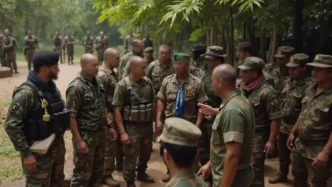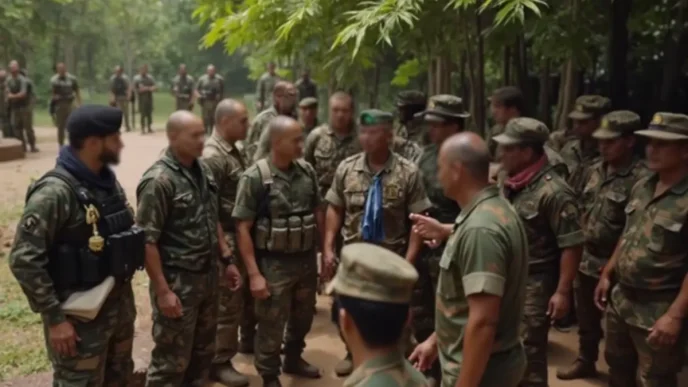In a historic and dramatic turn of events, former Philippine President Rodrigo Duterte was arrested on Tuesday upon his return from Hong Kong, marking the first time an Asian head of state has been detained on orders of the International Criminal Court (ICC) for alleged crimes against humanity. The arrest, linked to Duterte’s controversial “war on drugs” during his presidency from 2016 to 2022, culminated in his transfer to The Hague in the Netherlands, where he is set to face trial. The move has sparked intense debate over national sovereignty, justice for victims of extrajudicial killings, and the Philippines’ relationship with international law.
Duterte, 79, was apprehended shortly after his Cathay Pacific flight touched down at Ninoy Aquino International Airport (NAIA) at 9:20 a.m. local time. A tense standoff ensued between his legal team and authorities, lasting well into the night. By 11:03 p.m., Duterte was aboard a chartered Gulfstream G550 jet, tail number RPC5219, departing Villamor Air Base near Manila for The Hague, with a reported refuelling stop in Dubai. The operation was executed with the assistance of Interpol, as confirmed by President Ferdinand Marcos Jr., who described the arrest as a fulfilment of the country’s international commitments.
“Bringing him to The Hague will allow the former president to face charges of crimes against humanity in relation to his bloody war on drugs,” Marcos said during a late-night news conference. He emphasised that the Philippines was obliged to cooperate with Interpol, warning that non-compliance could jeopardise future assistance in cases involving Filipino fugitives abroad.
A Contentious Arrest
The arrest was not without controversy. Duterte, known for his defiant rhetoric, initially resisted, reportedly telling an officer, “You will just have to kill me if I don’t agree, if you side with the foreigners.” Despite this, he eventually complied, accompanied by his partner Honeylet Avanceña, their daughter Veronica (nicknamed Kitty), and key aides, including former Executive Secretary Salvador Medialdea. They were escorted to Kalayaan, the VIP hall at Villamor Air Base, where Major General Nicolas Torre III of the Philippine National Police’s Criminal Investigation and Detection Group read Duterte his Miranda rights.
Veronica Duterte took to Instagram to denounce the arrest as “illegal detention,” sharing videos and photos of her father. In one clip, Duterte can be heard questioning the legal basis for his detention: “What is the law and what is the crime that I committed? Show me now the legal basis for my being here.” Medialdea echoed these sentiments, calling the arrest warrant “questionable” and pointing out that the Philippines withdrew from the Rome Statute, which established the ICC, in March 2019 under Duterte’s own directive.
The ICC, however, maintains jurisdiction over crimes allegedly committed between November 2011—when Duterte was mayor of Davao City—and March 2019, before the withdrawal took effect. The court’s arrest warrant, received by Interpol’s Manila office prior to Duterte’s arrival, centres on accusations of orchestrating a brutal anti-narcotics campaign that resulted in thousands of extrajudicial killings, often referred to as “tokhang” raids in the Philippines.
Family and Allies React
Duterte’s other daughter, impeached Vice President Sara Duterte, who has publicly clashed with the Marcos administration, condemned the arrest as a violation of national sovereignty. Returning from Hong Kong on the same day, she issued a scathing statement: “Today, our own government has surrendered a Filipino citizen—even a former president—to foreign powers. This is a blatant affront to our sovereignty and an insult to every Filipino who believes in our nation’s independence.”
Sara Duterte further argued that her father was denied fundamental rights, including the opportunity to challenge the arrest before a competent judicial authority. “This is not justice—this is oppression and persecution,” she said, ending her statement with a plea: “God save the Philippines.”
Longtime allies of Duterte, including Senator Christopher Go and former Defence Secretary Delfin Lorenzana, were denied access to him at Villamor Air Base. Go, who had arranged an ambulance for Duterte citing health concerns—the former president turns 80 later this month—expressed frustration over the lack of due process and prioritisation of medical needs. “It’s sad. They will be arresting a person who only did his job for the country,” Go told reporters outside the airport.
Legal efforts to halt the arrest were swiftly initiated. Israelito Torreon, one of Duterte’s lawyers, filed a petition with the Supreme Court, though no immediate response was reported. Meanwhile, former Marcos press secretary Trixie Cruz-Angeles questioned whether the government had reversed its stance on ICC jurisdiction, likening the transfer to The Hague to “allowing a citizen to be kidnapped.”
Voices of the Victims
Amid the outcry from Duterte’s camp, others hailed the arrest as a long-overdue reckoning for the victims of his drug war. Senator Risa Hontiveros, a vocal critic of Duterte’s policies, welcomed the development as justice for the families of thousands killed in the anti-narcotics campaign. “The day that the families of Filipinos killed in the bloody ‘tokhang’ have been waiting for has arrived,” she said in a statement, urging Duterte to honour his past promise to face the ICC as a lawyer and follow the legal process.
Human rights groups have long accused Duterte of overseeing a campaign that disproportionately targeted the poor, with estimates of deaths ranging from 6,000 to over 30,000, depending on the source. The ICC’s investigation, launched in 2018, focuses on alleged systematic abuses, including summary executions by police and vigilante groups, during Duterte’s tenure as both mayor and president.
Sovereignty vs. International Justice
The arrest reignites a contentious debate over the Philippines’ obligations under international law versus its assertion of sovereignty. Duterte’s 2019 withdrawal from the ICC was framed as a rejection of foreign interference, with the former president repeatedly dismissing the court’s authority. Critics of the Marcos administration now question whether cooperating with the ICC signals a policy shift or a pragmatic decision to maintain international partnerships, as Marcos suggested in his remarks about Interpol commitments.
If confirmed, such a shift could have broader implications for how the Philippines navigates its foreign relations, particularly with Western nations that support the ICC. However, it risks deepening domestic divisions, as evidenced by the polarised reactions to Duterte’s arrest. While some see it as a triumph of accountability, others view it as a betrayal of national pride, with figures like Sara Duterte framing it as subservience to “foreign powers.”
Health and Legal Challenges Ahead
Concerns about Duterte’s health have also come to the forefront. Senator Go noted that the former president was scheduled for a medical check-up and procedure at Cardinal Santos Medical Center on Friday, raising questions about whether his condition will impact the legal proceedings in The Hague. At nearly 80, Duterte’s age and reported health issues may become a point of contention in his trial, with his legal team likely to argue for accommodations or delays.
Legally, the road ahead is uncertain. The ICC trial will scrutinise not only Duterte’s direct actions but also the systemic nature of the drug war, potentially implicating other officials. For now, the focus remains on whether Duterte will mount a robust defence or seek to challenge the court’s jurisdiction, as his allies have suggested. The outcome could set a precedent for how international tribunals address alleged crimes by heads of state in regions with complex political histories.
A Polarising Legacy
Rodrigo Duterte’s legacy, often encapsulated by his nickname “The Punisher,” remains deeply divisive. To his supporters, he is a strongman who tackled crime and corruption with an iron fist, prioritising the safety of law-abiding citizens. To his detractors, he is a symbol of impunity, whose policies unleashed a wave of violence that shattered communities and disregarded human rights. His arrest and impending trial at The Hague will likely intensify these debates, both within the Philippines and on the global stage.
As the Gulfstream jet carrying Duterte disappeared into the night sky on 11 March, it marked the end of one chapter and the beginning of another. For the families of the drug war’s victims, it is a moment of hope for justice, however delayed. For a nation grappling with its past and future, it is a reminder of the enduring tension between accountability and autonomy. What unfolds in The Hague will not only shape Duterte’s fate but also test the Philippines’ place in the international order.














